The UK Government has chartered a flight out of Lebanon for Britons wanting to leave amid fears of a wider conflict.
Foreign Secretary David Lammy described the situation in Lebanon as “volatile” and with the “potential to deteriorate quickly” as the flight, due to leave Beirut-Rafic Hariri International Airport on Wednesday, was confirmed.
Earlier on Monday night, Mr Lammy had reiterated calls for Britons in Lebanon to leave as he said the Government will do “all that we can” to assist people in fleeing.
We need your consent to load this Social Media content. We use a number of different Social Media outlets to manage extra content that can set cookies on your device and collect data about your activity.
The Associated Press news agency reported on Monday evening that the Israeli military had launched small ground raids against Hezbollah and sealed off communities along its northern border.
British nationals and their spouses, partners and children under 18 are eligible for the flight, and those who are vulnerable will be prioritised.
Mr Lammy said: “The situation in Lebanon is volatile and has potential to deteriorate quickly.
“The safety of British nationals in Lebanon continues to be our utmost priority. That’s why the UK Government is chartering a flight to help those wanting to leave. It is vital that you leave now as further evacuation may not be guaranteed
Speaking to broadcasters earlier on Monday evening, Mr Lammy said: “We will do all that we can to assist people to get out and we have secured places on commercial flights that are flying tomorrow so that UK nationals can get out.
“I urge them to leave because the situation on the ground is fast moving.”
We need your consent to load this Social Media content. We use a number of different Social Media outlets to manage extra content that can set cookies on your device and collect data about your activity.
He added: “And of course, whilst we will do everything we can to protect British nationals – and those plans are in place to do so – we cannot anticipate the circumstances and the speed with which we could do that if things escalate in a major way over the coming hours and days.”
Mr Lammy chaired a ministerial meeting of the Cobra emergency committee on Monday to discuss the crisis.
There are an estimated 5,000 British citizens in Lebanon and the Government says it is working on “all contingency options”.
British military assets have been deployed to Cyprus and the eastern Mediterranean in case an evacuation is required, although ministers and officials have stressed that Britons should leave immediately.
On Monday, the Prime Minister’s official spokesman said Sir Keir Starmer has been “very, very clear” that British nationals “should leave now, particularly whilst commercial flights are still available”.
The spokesman told reporters: “We’re doing everything we can to work with commercial airlines to maximise capacity because we want people to leave, and I understand that there have been extra Middle East Airlines flights leaving Lebanon over the weekend, another scheduled for Tuesday, and we have secured seats for British nationals on those flights.”
(PA Graphics)
It is understood around 15 spaces for British nationals were secured on a flight which arrived on Sunday, and a further 40 on the flight due to leave on Tuesday.
The spokesman said the focus is on “securing extra spaces on commercial flights for those who do want to leave and reiterating our calls for those to leave and to register their presence with us and book the first available flights”.
Meanwhile, the families of Israeli hostages kidnapped on October 7 have said the UK Government “must do more” to help bring them home.
Speaking at a press conference, relatives said a deal must be struck urgently with Hamas to bring people home.
During a meeting with Sir Keir and Mr Lammy on Monday, the Prime Minister agreed that the hostages must be freed and returned immediately, the conference was told.
Sharone Lifschitz, whose parents Yocheved and Oded Lifschitz were kidnapped, said she felt “encouraged” by the meeting, but urged the Government to do more.
“They listened carefully to what we said,” she said. “But I think the British Government can and should do more.
“They must treat (the hostages) as if they are their own.”
